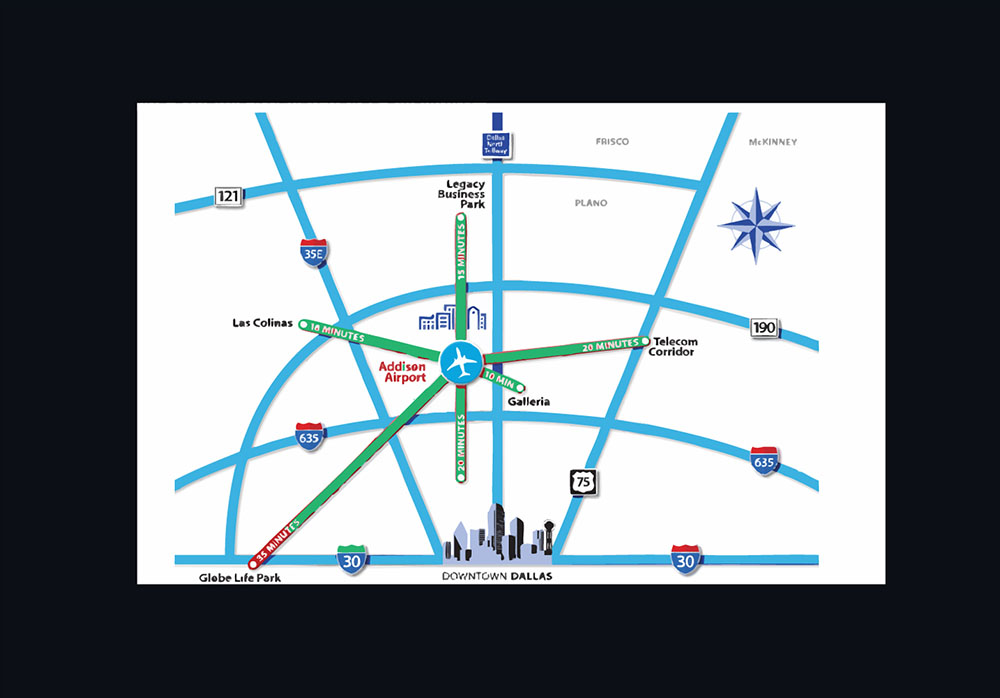Business Aviation Operations at Addison Airport (ADS)
19 April 2025
| By Just Aviation TeamAddison International Airport (IATA: ADS, ICAO: KADS) is a vital general aviation gateway near Dallas, strategically positioned for corporate and business aviation. Its 7,202-foot runway supports diverse aircraft operations, from business jets to charter flights. Unlike congested commercial airports, ADS has streamlined access to North Texas’ economic hubs, reducing travel time for executives and high-priority operations. With advanced facilities, dedicated FBOs, and proximity to key business districts, ADS plays a crucial role in enhancing regional connectivity and supporting dynamic aviation needs efficiently.

Addison International Airport (ADS) Supporting Business Aviation
Addison Airport (ADS) is a 24-hour general aviation hub serving the Dallas-Fort Worth area, with an FAA Control Tower operating daily from 6 a.m. to 10 p.m. In 2023, the airport recorded 119,065 aircraft operations, with 68% general aviation, 32% air taxi, and less than 1% airline and military use. It is home to 576 based aircraft, including 326 single-engine, 86 multi-engine, 157 jet, and 7 helicopters. While ADS lacks traditional airline terminals or gates, it features 3 Fixed Base Operators (FBOs). Additionally, its 24-hour U.S. Customs services enhance its role in international flight operations.
Addison Airport (ADS) Landing Permits: Requirements for Scheduled & Non-Scheduled Business Jets
Addison Airport (ADS/KADS) operates under strict regulatory and local guidelines to manage high-density traffic. Landing permits are mandatory for all non-local business jets, with distinctions between scheduled (FAR Part 135/121) and non-scheduled (FAR Part 91/125) operations.
Scheduled Operations (FAR Part 135/121)
Requires a pre-approved FAA Operations Specification (OpSpec) for ADS.
- Needed Documentations:
- FAA Form 4530-43 (Landing Permit Application).
- Noise Compliance Certificate (Stage 3/4 or Chapter 14 compliance).
- Proof of insurance ($1M minimum liability coverage).
- Slot confirmation (via ACS slot coordinator; see Section 2).
Non-Scheduled Operations (FAR Part 91/125)
Prior Permission Required (PPR): Mandatory for all transient business jets. Submit via ADS Airport Ops at least 24 hours in advance (72 hours during peak periods).
- Needed Documentations:
- PPR request (tail number, operator contact, ETA/ETD).
- eAPIS manifest (for international arrivals).
- CBP Form 178 (non-U.S. registered aircraft).
- Stage 3/4 noise certification (no exceptions; ADS enforces strict noise abatement).
For international arrivals, coordinating with CBP via “gateway” airports are crucial (e.g., pre-clearance at KDFW) to expedite processing.
Addison Airport (ADS) Slot Coordination & Peak Times
ADS is a Level 2 (Schedules Facilitated) airport under IATA guidelines, requiring slots for all arrivals/departures between 07:00–22:00 Local Time.
Slot Allocation Process
- Submission Window: Slots requested via Airport Coordination Limited (ACL) or local coordinator ACS (72 hours minimum pre-operation).
- Parameters: Include aircraft type (e.g., Gulfstream G650, Embraer Praetor 600), tail number, and operator contact.
- Confirmation: Slots issued via email with a unique ID; validate via ACS portal.
Critical Peak Hours
- Morning Peak: 07:00–10:00 (Corporate traffic surge due to business meetings).
- Evening Peak: 16:00–19:00 (Departure rush; frequent ground delays)
Slot Violation Penalties
- Unused slots reported to the FAA may incur fines (per 14 CFR § 93.223).
- Repeated violations risk slot priority downgrades.
Operational Constraints & Mitigation Strategies
Addison Airport has strict noise abatement procedures to minimize disruption to surrounding communities. Departing aircraft must climb to 1,500 feet AGL before initiating any turns and avoid noise-sensitive areas northeast of the Runway 34 threshold. For arrivals, idle reverse thrust is required on Runway 34 after 22:00 to reduce noise impact during late-night operations.
Ground Handling Facilities & Services
Addison Airport (ADS/KADS) has comprehensive ground support tailored to business jet operations, emphasizing efficiency and compliance with FAA/TSA regulations:
Fuel Handling
Addison Airport has Jet A fuel available through a hydrant system and mobile refuelers, with prior notice required for high-volume requests. 100LL AvGas has limited availability, requiring confirmation at least 24 hours in advance. Daily fuel quality checks follow ASTM D1655 and ISO 8217 standards, incorporating aviation fuel filtration solutions. Diesel Exhaust Fluid (DEF) is available for ground support equipment (GSE) meeting EPA Tier 4 sustainability requirements.
Fueling protocols at ADS include hot refueling, permitted with fire department standby when requested through ADS Operations at least one hour in advance. International arrivals must undergo mandatory contamination checks, with fuel samples retained for 30 days. To streamline operations, operators can pre-order fuel via ADS’s digital fuel management portal for priority scheduling. In colder months, insulated fuel hoses help prevent microbial growth in fuel systems.
Ramp Handling
Addison Airport has 28V DC and 115V AC GPU units, compatible with aircraft such as the Gulfstream G650 and Bombardier Global Express. Towbars are available for all business jet types, including the Embraer Phenom 300 and Cessna Citation XLS+. Deicing operations use SAE Type I and IV fluids applied via boom trucks, with holdover time tables provided by ADS Operations.
For lavatory and water services, ADS has biodegradable Blue Ice lavatory fluid, with formaldehyde-based chemicals not permitted. Potable water trucks are USDA-certified, and a static purge is required after each service to ensure water quality.
Cabin & Cargo Services
Addison Airport has cold storage for pre-ordered catering, requiring a 48-hour notice. Waste disposal follows TSA air cargo security regulations to ensure compliance.
For cargo handling, the airport has a maximum weight limit of 3,000 lbs per pallet, compatible with Bombardier Challenger 650 ULDs. Dangerous goods are stored in Class 1 hazmat bunkers under FAA Part 175 regulations. All cargo undergoes mandatory security screening, with TSA-approved X-ray facilities available onsite.
Navigating the complexities of Addison Airport (ADS) demands precision, expertise, and seamless coordination. From landing permits and slot management to tailored ground handling, every detail matters. Just Aviation makes your business flight operations better, even during peak times. With a focus on compliance, efficiency, and operational excellence, we elevate your experience at ADS, where every second counts and every detail is meticulously managed.